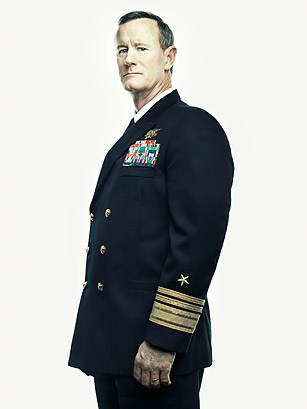
(3 of 4)
Marcinko picked McRaven to lead a team in the hot new command with a purposely wonky name: Naval Special Warfare Development Group.
Those were the Wild West days of special operations, and McRaven did not share his commander's easygoing attitude about rules.
Marcinko rented Mercedes sedans with Navy funds, a friend of McRaven's says, "just because he could." False, Marcinko says. He bought them. The standard-issue AMC Eagle wagon was no kind of ride for commandos. "If I were to react to a ship takedown in a foreign port or an embassy in a foreign country, the Eagles would stick out like a" — O.K., well, that's as much of the quote as you get in TIME.
Marcinko acknowledges that he arranged for female companions at the hard-drinking beach parties he threw on Navy property, but it would not be politically correct, he says, to call them "ladies of the night."
"The SEALs were happy, I was happy, and nobody was getting in trouble except Bill McRaven," he says.
There were more serious charges, one of which eventually landed Marcinko in prison. But by then he and his young lieutenant had fallen out. Marcinko fired the 27-year-old McRaven after a year. "He was a bright guy, but he didn't like my rude and crude way," Marcinko said. "If I was a loose cannon, he was too rigid. He took the special out of special warfare."
Today, McRaven calls Marcinko a "charismatic figure" who deserves credit for building an important new unit from scratch. "I was not some white knight on a horse going with my lance against the windmill," he says. "He was the boss. I was a very young lieutenant. There were some things I didn't think were exactly right ... and he relieved me." Plenty of junior officers admired McRaven's stand, but most, as one puts it, "thought that was the end of his career." With otherwise outstanding efficiency reports, however, McRaven won a chance at platoon command in SEAL Team 4. From there he began an extraordinary rise, moving rapidly through command and operational roles. His only known experience of combat before reaching flag rank came as a SEAL "task unit" leader in the Persian Gulf War. Every particular of his missions remains classified.
The Theory and Practice of Special Ops
Like most promising midcareer officers, the 36-year-old McRaven was dispatched to the Naval Postgraduate School in Monterey, Calif. There he produced an original treatise, "The Theory of Special Operations," that the Navy credits with "considerable impact not only on the special-operations community but on [the Defense Department] at large." It begins by stating matter-of-factly that Carl von Clausewitz, the Prussian strategist whose On War is a standard text, was wrong about two of his central maxims. That is not exactly the same as choosing two commandments to rebut in church, but it is provocative. The master's thesis, which weighs in at 612 pages, proposes a theory of "relative superiority" to explain how a small offensive force can defeat a larger, well-fortified defense, which Clausewitz described as holding a decisive advantage. Along the way, McRaven sketches the qualities required to pull off something very much like the bin Laden raid, 18 years in advance: "a simple plan, carefully concealed, realistically rehearsed and executed with surprise, speed and purpose." On the downside, "relative superiority" does not last long.
Then, in 2001, came the parachute accident and the long climb back. "He walked again, which was amazing," sister Nan recalls. "He was climbing the steps, and it was agony, step by step. We were holding our breath whether he could make it. It still brings me to tears."
Around that time came a call from Wayne Downing, a retired Army four-star general. President George W. Bush had asked Downing to inaugurate a new position as Deputy National Security Adviser for Combatting Terrorism. Downing wanted McRaven on his staff. It was an ideal post for a cerebral commando whose body needed mending. McRaven charmed the civilians on staff over late-night beers at the Smith & Wollensky steak house. He kept tabs on the SEALs who had gone to war without him. "It was hard to watch it from afar, at the White House, but at the time, because I was still broken up pretty bad, I'm not sure I could have done much to help," he says.
In a new book from TIME, Special Ops: The Hidden World of America's Toughest Warriors, international editor Jim Frederick reports on the secret world of the U.S. military units. Now available in bookstores everywhere, or go to time.com/specialops to order your copy today.